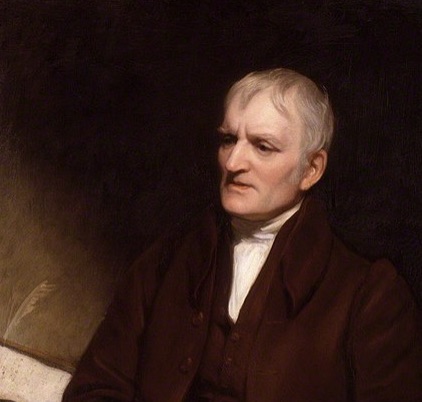
John Dalton was born on September 6, 1766, in Eaglesfield, Cumberland, England. He came from a Quaker family and received his early education from his father and a Quaker school in his hometown. At age 15, Dalton joined his older brother Jonathan in running a Quaker school in Kendal, Westmorland about 45 miles from his home. In 1793, Dalton moved to Manchester, where he joined the Manchester Literary and Philosophical Society and became a teacher of mathematics and natural philosophy (physics) at the New College in Manchester. His association with the society and access to its library allowed him to engage with the latest scientific developments. However, when the school ran out of money 7 years later, John resigned and earned his living as a private tutor.
By 1787, Dalton had become interested in meteorology and began to record his observations about weather in a meteorological diary that would accumulate to more than 200,000 observations in the span of the next 6 decades. In 1793, he organized and presented his observations in his first publication, Meteorological Observations and Essays. Then, in 1801, he formulated Dalton’s Law of Partial Pressures, stating that the total pressure exerted by a mixture of gases is equal to the sum of the partial pressures of individual gases in the mixture. This helped to explain the behavior of gases such as nitrogen and oxygen in the atmosphere.
In 1808, Dalton published his book titled, A New System of Chemical Philosophy, in which he laid the foundations of his atomic theory. His theory proposed that matter is composed of indivisible atoms, each with a specific mass, and that chemical reactions involve the rearrangement of these atoms. Included in this model was the introduction of atomic weights (now described as atomic mass). By calculating the relative atomic weights of different chemical elements, Dalton provided a method of determining for any chemical compound, its constituent elements and their proportions. This made possible the assignment of a chemical formula to each chemical compound.
Dalton suffered from a speech impediment after minor strokes in 1837 and 1838, and then succumbed to a final stroke on July 27, 1844. Through his meticulous observations and careful analyses, Dalton laid the foundation for our modern understanding of the behavior of matter at the atomic and molecular levels. He will always be recognized as one of the great pioneers of chemistry.
